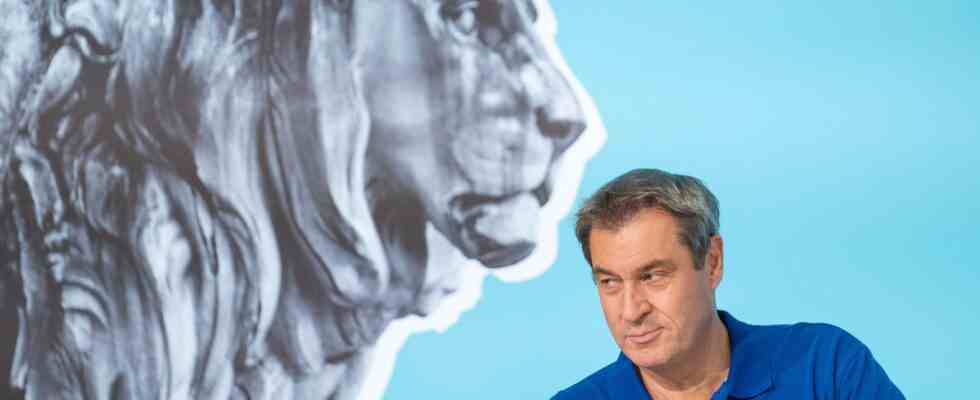analysis
As of: 07/21/2022 6:24 p.m
For customs, for nuclear power, against the traffic light government: At the CSU summer meeting, it becomes clear how much the party and its boss Söder are still struggling with their new strategy. But where does this lead?
Sharp criticism of the traffic light and many of its own demands: the CSU has arrived in the federal opposition in the opposition, as the summer retreat of the Bundestag deputies in the Upper Franconian Banz monastery showed. Your list of orders for the federal government is long – extend nuclear power, missile protection shield, new free trade agreements, corporate tax reform, scrapping bonus for power-intensive household appliances and much more.
Perhaps more important than individual demands is the message that the meeting is supposed to send: The CSU, like its big sister party CDU, wants to stand for strength and stability again. After the federal election, quiet self-doubt made the rounds among the Christian Socialists: How big was Markus Söder’s contribution to the poor performance of the Union with Armin Laschet after his failed chancellor candidacy? How can the CSU in her Bayern, changing, staying number one or even back to old strength?
Söder’s strategy question
Above all, the question of strategy is increasingly preoccupying the Christian Socialists. Söder has reinvented himself more often since he took over the State Chancellery in 2018: first brute and disturbing for many (“asylum tourism”), in the meantime as a caring father of the country with a focus on insect rescue. During the Corona period, Söder was strict and concerned, and his poll numbers had reached enormous heights in the meantime. At some point he annoyed many with his constant reminders – and finally announced his move to “Team Freedom”.
And now, with a view to the state elections in just over a year, which the CSU boss has declared to be the “fate election for Bavaria”? Which Söder is moving into the upcoming state election campaign is only vaguely recognizable. In addition to persistent criticism of the traffic lights in Berlin, which supposedly hates Bavaria, he is currently trying identity politics. Against gender, for traditional costumes, against vegan food, for old Bavarian butchers, and so on. “We are open to the world – not provincial, but value-oriented,” said Söder before the deputies in the Banz monastery, according to the participants.
Söder at the folk festival, Söder at the fire brigade
Otherwise, the Prime Minister relies on proximity, proximity, proximity: Söder at the folk festival, Söder at the fire brigade, Söder at the samba festival in Franconia. The party leader expects a lot from it: “Everyone can do video conferences, only the CSU can do beer tents,” he said internally in Banz. So the CSU is again targeting the so-called regular voters. This is at least a small course correction: After the federal elections, one of the key findings was that one had to reach the many newcomers to Bavaria – who might not be quite so euphoric about traditional costumes and sausage love.
Repeated internal traffic light disputes between the Greens and the FDP, the difficult energy situation: times are not so bad for the opposition, to which the CSU now belongs. But: In Bavaria, people continue to govern – and have done so without interruption for almost 70 years. And at the federal level too, constant criticism at traffic lights is a thing. Because the competition emphasizes: Until recently, the CSU was part of the federal government in those 16 years in which, for example, dependence on Russian energy grew and grew.
Power-conscious CSU
There are also other areas of attack, albeit fading: the mask deals by ex-CSU MPs Sauter and Nüßlein, the suspicion of plagiarism against the new General Secretary Martin Huber, the failed car toll and its expensive consequences.
Anyone who asks around, in the CSU and elsewhere, will get very different benchmarks for Söder’s Bavarian election result in autumn 2023. Some say: Even with 33 percent, he can remain prime minister, provided he can quickly build a stable coalition.
The others say: Even 35 percent could be too little for the power-conscious CSU, especially if Söder should need two coalition partners instead of the previous one. And those who don’t mean it so well with the CSU boss set the bar at 40 percent.
Söder’s core clientele focus
The next few months will show how well Söder’s mix of physical proximity to the people, scolding Berlin and a focus on regular clients works. The Christian Socialists also do not yet have their Bavarian main theme for the election campaign. In any case, saying no to the excessive truck transit traffic in southern Bavaria should only work regionally.
Whether the “year of implementation” proclaimed by the state government for Söder’s Bavarian plans, from the high-tech agenda to the housing boom, will convince voters? Will the demonstrative unity with the CDU under Friedrich Merz bring back frightened conservatives? All part of the big puzzle that the CSU is currently sitting in front of. Whether the puzzle gives a coherent picture in the end should also decide how Söder’s career will continue.

